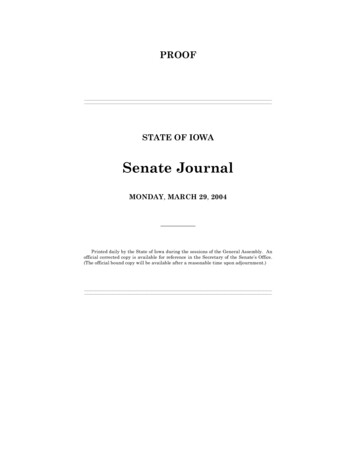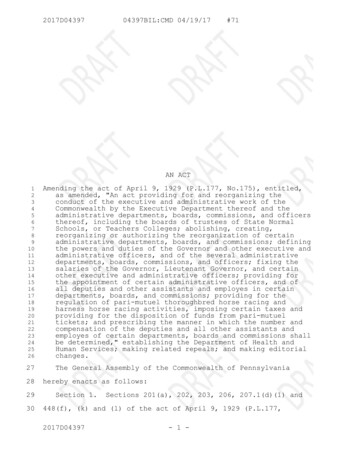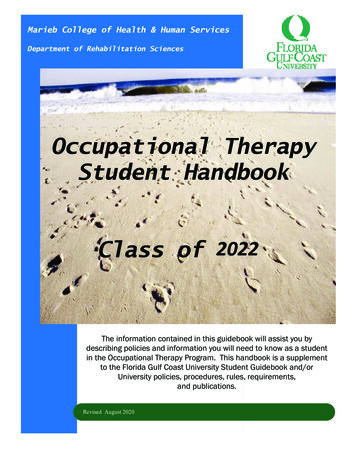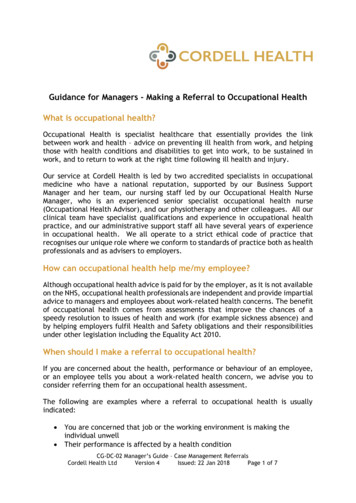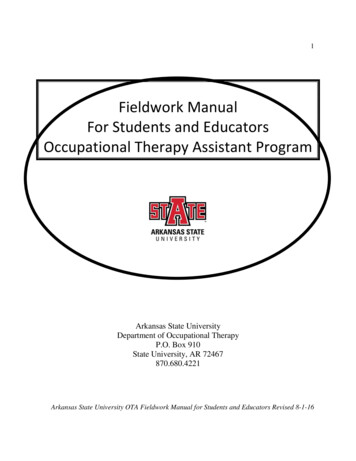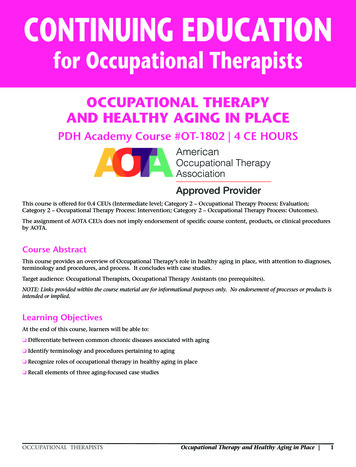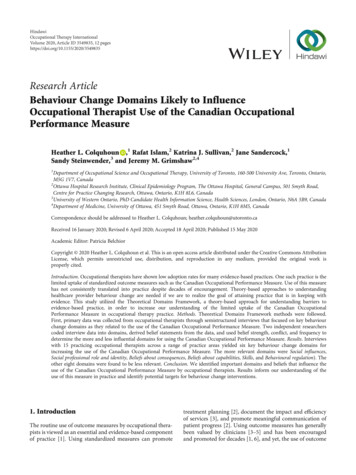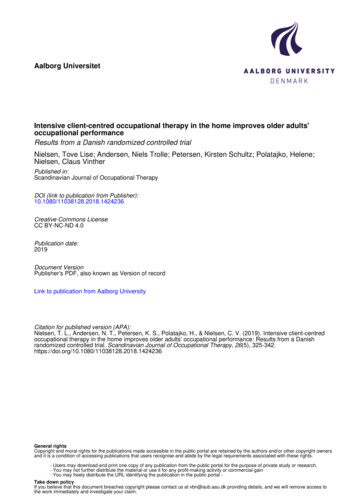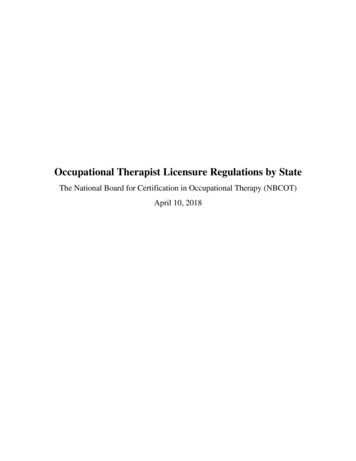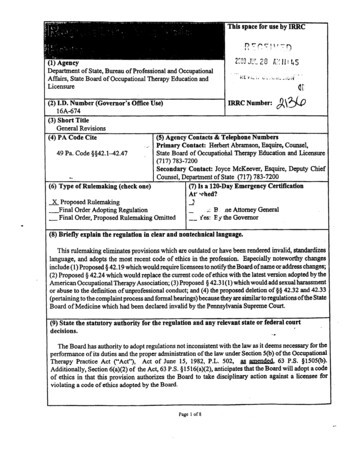
Transcription
This space for use by IRRC(1) AgencyDepartment of State, Bureau of Professional and OccupationalAffairs, State Board of Occupational Therapy Education andLicensure2C00 JUL 28 A;-(l :!»5tt(2) I.D. Number (Governor's Office Use)IRRC Number #Ht 16A-674(3) Short TitleGeneral Revisions(5) Agency Contacts & Telephone Numbers(4) PA Code CitePrimary Contact: Herbert Abramson, Esquire, Counsel,49 Pa. Code §§42.1-42.47State Board of Occupational Therapy Education and Licensure(717)783-7200Secondary Contact: Joyce McKeever, Esquire, Deputy ChiefCounsel, Department of State (717) 783-7200(7) Is a 120-Day Emergency Certification(6) Type of Rulemakiug (check one)Af rhed?X Proposed RulemakingJFinal Order Adopting Regulationj : B lie Attorney GeneralFinal Order, Proposed Rulemaking Omittedf es: Ey the Governor(8) Briefly explain the regulation in clear and nontechnical language.This rulemaking eliminates provisions which are outdated or have been rendered invalid, standardizeslanguage, and adopts the most recent code of ethics in the profession. Especially noteworthy changesinclude (1) Proposed § 42.19 which would require licensees to notify the Board of name or address changes;(2) Proposed § 42.24 which would replace the current code of ethics with the latest version adopted by theAmerican Occupational Therapy Association; (3) Proposed § 42.31(1) which wouldadd sexual harassmentor abuse to the definition of unprofessional conduct; and (4) the proposed deletion of §§ 42.32 and 42.33(pertaining to the complaint process and formal hearings) because they are similar to regulations ofthe StateBoard of Medicine which had been declared invalid by the Pennsylvania Supreme Court.(9) State the statutory authority for the regulation and any relevant state or federal courtdecisions.The Board has authority to adopt regulations not inconsistent with the law as it deems necessary for theperformance of its duties and the proper administration of the law under Section 5(b) of the OccupationalTherapy Practice Act ("Act"), Act of June 15, 1982, PL. 502, a§ amended. 63 P.S. §1505(b).Additionally, Section 6(a)(2) of the Act, 63 P.S. §1516(a)(2), anticipates that the Board will adopt a codeof ethics in that this provision authorizes the Board to take disciplinary action against a licensee forviolating a code of ethics adopted by the Board.Page I of 8
&\.-u!Fi.U i(10) Is the regulation mandated by any federal or state law or court order, or federal regulation?If yes, cite the specific law, case or regulation, and any deadlines for action.The regulation is not mandated by any federal or state law or court order, or federal regulation.(11) Explain the compelling public interest that justifies the regulation. What is the problem itaddresses?This rulemaking clarifies regulations for both licensees and the public and eliminates outdated provisionsor provisions rendered invalid by court decisions. The revisions will help licensees to understand theirobligation to inform the Board of their current address and name. The public will be better protected andlicensees will benefit from the explicit" addition of sexual abuse and harassment to the kinds of conduct thatmay be considered unprofessional. Both licensees and the public will have the benefit of being able to findthe most current code of ethics of the profession in the regulations of the Board.(12) State the public health, safety, environmental or general welfare risks associated withnonregulation.Absent these regulations both the public and licensees wouldfindthe regulations partially outdated, lessclear, and containing provisions which have been rendered invalid by court decisions.(13) Describe who will benefit from the regulation. (Quantify the benefits as completely aspossible and approximate the number of people who will benefit)The 6,719 licensed occupational therapists and 3370 licensed occupational therapy assistants will benefitfrom clearer, more up to date regulations. The general public will benefit by knowing that occupationaltherapists are obligated to conform to clearly enunciated ethical standards and not intimidate, harass, or orabuse a patient sexually.Page 2 of 8
(14) Describe who will be adversely affected by the regulation. (Quantify the adverse effects ascompletely as possible and approximate the number of people who will be adversely affected.)No adverse effects are anticipated.(15) List the persons, groups or entities that will be required to comply with the regulation.(Approximate the number of people who will be required to comply.)All licensed occupational therapists and assistants will be required to comply with this regulation. Boardrecords show 10,089 persons hold occupational therapy and occupational therapy assistant licenses, and allofthose licenses are active.(16) Describe the communications with and input from the public in the development anddrafting of the regulation. List the persons and/or groups who were involved, if applicable.In drafting and promulgating the regulation the Board solicited input and suggestionsfromthe regulatedcommunity by providing drafts to organizations and entities which represent the profession, educationalinstitutions, and interested individuals. A list ofthe organizations and entities is attached.(17) Provide a specific estimate of the costs and/or savings to the regulated community associatedwith compliance, including any legal, accounting or consulting procedures which may berequired.There are no savings to the regulated community associated with compliance. Some licensees will beara small additional cost because of the requirement that they inform the board in writing of changes in nameor address within ten days of the change. At the present time many licensees immediately inform the Boardof changes in name and address. Those who might otherwise have waited for the renewal might expend thecost of a postage stamp in keeping the Board informed. Licensees with access to fax machines and e-mailwill have a smaller cost.The regulations do not impose new legal, accounting or consulting procedures.Page 3 of 8
(18) Provide a specific estimate of the costs and/or savings to local governments associated withcompliance, including any legal, accounting or consulting procedures which may be required.Local governments would not be affected by this regulation.(19) Provide a specific estimate of the costs and/or savings to state government associated with theimplementation of the regulation, including any legal, accounting, or consulting procedures whichmayberequired.No costs or savings or legal, accounting or consulting activities are anticipated in connection with theimplementation of this regulation.Page 4 of 8
(20) In the table below, provide an estimate of the fiscal savings and costs associated withimplementation and compliance for the regulated community, local government, and stategovernment for the current year and five subsequent years.FY 4FY 3FY 5FV 2Current FYFY 1SAVDVGS: N/A N/A N/ARegulatedLocal GovernmentState GovernmentTotal SavingsCOSTS:RegulatedLocal GovernmentState GovernmentTotal C@stsREVENUE LOSSES:RegulatedLocal GovernmentState GovernmentTotal Revenue Losses(20a) Explain how the cost estimates listed above were derived.N/APage 5 of8 N/A N/A N/A
(20b) Provided:*; ast three year expenditure history for programs affected by the regulation.ProgramFY-3N/AFY-2N/AFV-1Current FYN/A(21) Using the cost-benefit information provided above, explain how the benefits of the regulationoutweigh the adverse effects and costs.There should be no adverse effects associated with compliance of this regulation. The cost to licenseesof providing written notice of change of name and address is de minimis compared to the benefit ofbeing assured that they will receive mailings from the Board, including notice of renewals.(22) Describe the nonregulatory alternatives considered and the costs associated with thosealternatives. Provide the reasons for their dismissal.Nonregulatory alternatives were not considered. This rulemaMng generally revises and updates existingregulations. The Board did not consider a non-regulatory alternative to the provision requiring licensees toapprize the Board of name and address changes because the Board wanted to establish the requirement asa binding norm.(23) Describe alternative regulatory schemes considered and the costs associated with thoseschemes. Provide the reasons for their dismissal.Because the proposal generally only amends an existing regulatory scheme, the Board did notconsider aw alternative regulatory scheme.Page 6 of8
(24) Are there any provisions that are more stringent than federal standards? If yes, identify thespecific provisions and the compelling Pennsylvania interest that demands stronger regulation.(25) How does this regulation compare with those of other states? Will the regulation putPennsylvania at a competitive disadvantage with other states?The amendments do not affect any matter that might impact on Pennsylvania's competitiveness and arenot expected to put Pennsylvania at a competitive-disadvantage with other states. The amendments willgenerally update and clarify existing regulations.(26) Will the regulation affect existing or proposed regulations of the promulgating agency orother state agencies? If yes, explain and provide specific citations.The amendments will not aSect regulations of other agencies.(27) Will any public hearings or informational meetings be scheduled? Please provide the dates,times, and locations, if available.The Board has not scheduled public hearings or informational meetings. The Board already solicitedinput from major professional associations representing licensees (see Item 16), and is willing to hear inputfrom interested parties at any of its regularly scheduled meetings.Page 7 of 8
(28) Will the regulation change existing reporting, record keeping, or other paperworkrequirements? Describe the changes and attach copies of forms or reports which will be requiredas a result of implementation, if available.The amendments will require licensees to notify the Board in writing of changes in name and address.No speciSc form will be required.(29) Please list any special provisions which have been developed to meet the particular needs ofaffected groups or persons including, but not limited to, minorities, elderly, small businesses, andfarmers.The Board has perceived no special needs of any subset of its licensees for whom special provisionsshould be made.(30) What is the anticipated effective date of the regulation; the date by which compliance withthe regulation will be required; and the date by which any required permits, licenses or otherapprovals must be obtained?The amendments will be effective on publication of the final form regulation in the fm/wyZywifo(31) Provide the schedule for continual review of the regulation.The Board conducts ongoing review of its regulations to evaluate their continued efBcacy.Page 8 of8
RANGOS SCHOOL OF HEALTH SCIENCESDUQUESNE UNIVERSITY227 Health Sciences BuildingPittsburgh, PA 15282-0001COLLEGE MISERICORDIADivision of Health Sciences301 Lake StreetDallas, PA 18612-1098ELIZABETHTOWN COLLEGEOne Alpha DriveElizabethtown, PA 17022-2298 -TEMPLE UNIVERSITYCollege of Allied Health Programs3307 North Broad StreetPhiladelphia, PA 19140THOMAS JEFFERSON UNIVERSITYEdison Building, Room 820130 South 9th StreetPhiladelphia, PA 19107-5233UNIVERSITY OF PITTSBURGHSchool of Health & Rehab116 Pennsylvania HallPittsburgh, PA 15261-1813UNIVERSITY OF SCRANTONScranton, PA 18510-4501Lillian Briola, DirectorCOMMUNITY COLLEGE OF ALLEGHENY CO.Boyce Campus595 Beatty RoadMonroeville, PA 15146-1395HARCUM COLLEGEBryn Mawr, PA 19010LEHIGH CO. COMMUNITY COLLEGE4525 Education Park DriveSchnecksville, PA 18078-2598
MOUNT ALOYSIUS COLLEGEOne College DriveCresson, PA 16630PENNSYLVANIA COLLEGE OF TECHNOLOGYOne College AvenueWilliamsport, PA 17701-5799THE PENNSYLVANIA STATE UNIVERSITYTulpehocken RoadPost Office Box 7009Reading, PA 19610-6009Susan McFaddenNBCOT800 S. Frederick Avenue, Suite 200Gaithersburg, MD 20877-2150Edna WooldridgeAOTCB4 Research Place, Suite 160Rockville, MD 20850-3226Mary Ellen Carter, Program ManagerAOTA - State Government Affairs4720 Montgomery LanePost Office Box 31220Bethesda, MD 20824-1220Debbie BarnhartOccupational Therapy DepartmentCHAMBERSBURG HOSPITAL112 North 7th Street, P.O. Box 6005Chambersburg, PA 17201-6005Sue Parker, PresidentPOTA234 Walnut RoadStrafford, PA 19087
Kari MontgomeryAdministrative AssistantOT WEEK4720 Montgomery Lane, Suite 603Bethesda, MD 20814-3400E.J. Brown, Editor of OTMERION PUBLICATIONS650 Park Avenue, WestKing of Prussia, PA 19406Louise Fawcett, Ph.D.NATIONAL COMMISSION ON COIN OCCUPATIONAL THERAPYPost Office Box 234Lake Elmo, MN 55042-0234
PACE SHEETFOR PILING DOCUMENTSWITH THE LEGISLATIVE REFERENCE BUREAUpcpuivrpZmJUL23 AMI!: 45(Pursuant to Commonwealth Documents Law)}\ L V I L i« U ; it i i J j I i 4itCopy b«lW is hereby approved as toform and reality. Attorney GeneralA&tDO NOT WRITE IN THIS SPACECopy below is hereby certified to be a true and correctcopy of a document issued, prescribed or promulgated by:Copy below is approved asto form and legality.Executive or Independent* State Board of Occupational TherapyEducation and LicensureDOCUMENT/FISCAL NOTE NO.16A-674JUL 1 1 2000,TB dF APPROVALDATS OF APPROVALi/ /2/oU - Hanna Gruen(Deputy General Counsel-AndUpAadent Agency(Strike inapplicableChairperson(EXECUTIVE OFFICER, CHAIRMAN OR SECRETARY) []Check if applicableCopy not approved.Objections attached.t ] Check ifapplicable. No AttorneyGeneral approval orobjection within 30 dayafter submission.NOTICE OF PROPOSED RULEMAKINGCOMMONWEALTH OF PENNSYLVANIADEPARTMENT OF STATEBUREAU OF PROFESSIONAL AND OCCUPATIONAL AFFAIRSSTATE BOARD OF OCCUPATIONAL THERAPY EDUCATION AND LICENSURE49 PA. CODE, CHAPTER 42GENERAL REVISIONS
May 22, 2000G*n*ral RmvimionmPREAMBLEThe State Board of Occupational Therapy Education and Licensure(Board) proposes general revisions to its regulations governingoccupational therapists and occupational therapy assistants at 49Pa. Code, §§ 42.1-42.47, as set forth in Annex A.A.Effective DateThe amendments will be effective upon publication of finalform regulations in the Pennsylvania Bulletin.B,Statutory AuthorityThe Board is authorized to promulgate and adopt regulationsnot inconsistent with law as it deems necessary for the performanceof its duties and the proper administration of its enabling statuteunder section 5(b) of the Occupational Therapy Practice Act (Act)(63 P.S. § 1505 (b)).Section 6(a)(2) of the Act (63 P.S. §1516 (a) (2) ) anticipates that the Board will adopt a code of ethicsin that this provision authorizes the Board to take disciplinaryaction against a licensee for violating a code of ethics adopted bythe Board.C.Background and PurposeThe proposed amendments result from the Board's systematicreview of its regulations in accordance with the principles andrequirements of Executive Order 1996-1 of February 6, 1996. TheExecutive Order directs executive agencies to evaluate existingregulations and amend and repeal regulations as necessary to complywith the order. In accordance with the Executive Order a draft ofthis proposal was sent on May 18, 1999, to 21 agencies,associations, and individuals who have been identified ' asinterested parties or who have expressed an interest "in thisproposed rulemaking. The Board received comments as a result ofthis mailing and reviewed them at its meeting of June 19, 1999.The Board made a number of changes to the draft proposal as aresult of the comments.The Board seeks in these revisions to eliminate provisionswhich are outdated or have been rendered invalid, to standardize
May 22, 2000General Revisionsand simplify language in provisions that maintain their validity,and to adopt the most recent code of ethics in the profession.These revisions would make editorial changes to 12 sections(42.3, 42.11, 42.12, 42.14, 42.15, 42.21, 42.31, 42.42-42.45, and42.47), make substantive changes to two sections (42.1 and 42.24),delete three sections (42.18, 42.32, and 42.33), and add one newsection (42.19). Throughout the proposed rulemaking the phrase currently licensed occupational therapist or currently licensedoccupational therapy assistant' is replaced with licensee.' Thisis the only change proposed for sections 42.42-42.47.§42.17DefinitionsThe proposed rulemaking would replace the definition of"AOTCB" with "NBCOT," National Board for Certification inOccupational Therapy, Inc.NBCOT is the current name of thenationalcertifying agency which prepares the certifyingexamination and screens examination candidates to determine thatthey have met educational and fieldwork requirements. Throughoutthis proposed rulemaking "AOTCB" is replaced with "NBCOT'The definitions section would also be amended to includedefinitions of "service recipient" and "surrogate." These termsare used in the 1994 revisions to the Occupational Therapy Code ofEthics which the Board proposes to adopt at § 42,24,§42.3.Meetings of the BoardThe proposed rulemaking would delete § 42.3 (a) which relatesto the frequency of Board meetings. This subsection paraphrasesthe first sentence in Section 4(e) of the Act (63 P.S. § 1504(e))which requires the Board to meet at least twice a year andauthorizes the Board to hold additional meetings whenevernecessary. Section 42.3 (a) is not serving a useful purpose in theBoard's regulations. It neither interprets the Act nor reflectsthe actual frequency of Board meetings. The Board has been meetingapproximately six times a year for more than a decade.§42.14.Foreign-trained applicants.
May 22, 2000General RevisionsThe proposed rulemaking would make three changes to thissection.As already indicated above, MAOTCB" is replaced with"NBCOT."Second, here and throughout the proposal, the word"trained" is replaced with "educated."The Board makes thischange to avoid confusion. NBCOT uses the word "educated" in allinformation and instructions that it provides to persons whoreceived their instruction in occupational therapy outside of theUnited States, its territories, and Canada and seek a NBCOTcredentials evaluation. The term educated is equivalent to theterm training used in Section 3 of the Act. (63 P.S. §§ 1503 and1510) Moreover, the Board believes that the word "educated" isconsistent with the professional nature of the preparation ofoccupational therapists and assistants.Third, the Board proposes to delete § 42.14(a) (3).Thecredentialing evaluation performed by NBCOT assures that theapplicant has completed a period of supervised fieldwork that meetsthe requirements of Section 8(3) of the Act (63 P.S. § 1508(3)) andis at least equivalent to the minimum fieldwork required forapplicants educated in the United States under § 42.13(3). NBCOTrequires at least 1,000 hours of fieldwork in order to establisheligibility to take the certification examination.Therefore,Section 42.14(a) (3) is unnecessary and potentially confusing.§42.18.Licensure requirementThe Board proposes to delete this section as it duplicates thesubstance of Section 6(a) of the Act (63 P.S. § 1506(a)) withoutadding anything to assist in understanding that section and doesnot contain subsections (b) and (c) of Section 6 of the Act.§42.19.Licensee's change of name or address; service of processand legal papers.The proposed rulemaking would add this new section which isintended to put licensees on notice that they are responsible fornotifying the Board in writing of changes in name and address andthat they will bear the responsibility for any consequences if theydo not tell the Board of changes. The proposed rulemaking furtherputs licensees on notice that their most recent name and address onfile with the Board will be deemed their official name and addressfor the purpose of service of process and other legal papers. Itis consistent with law governing service of process that if adocument is sent to a licensee's last known address on file withthe Board, that constitutes reasonable service.Kobylski v.
May 22, 2000General RevisionsCommonwealth, Milk Marketing Board, 516 A.2d 75 (Pa. Cmwlth. 1986).§42.24.Code of EthicsThe current code of ethics was promulgated by the AmericanOccupational Therapy Association in 1988. AOTA is a erapistsandoccupational therapy assistants.In promulgating its code ofethics AOTA seeks to promote and maintain high standards ofbehavior in occupational therapy.1 AOTA revised its code in July1994.2 The proposed rulemaking updates the Board's code so that itwill reflect the AOTA revised code. The Board proposes to adoptthis code because it both reflects the Board's own view of ethicalpractice and will keep Pennsylvania's ethical standards consistentwith the national standard.While much of the content of theproposed code is contained in the 1988 version, the proposed codecontains a number of noteworthy changes. First, the proposed codecontains six core principles rather than four. The principlesinclude concern for the well-being of the recipients of services,respect for the rights of recipients of services, maintenance ofhigh standards of competence, compliance with relevant law andregulations, provision of accurate information about occupationaltherapy services, and fair and discreet treatment of colleagues.Several of the new provisions are noteworthy. The revisedcode requires licensees to provide services in an equitable mannerfor all individuals. (Principle l.A.)This simple statementreplaces a list of ten prohibited bases for discrimination found inthe current Principle (1)(i).The revised code explicitly prohibits a licensee frommaintaining a relationship which exploits the recipient of servicessexually, physically, emotionally, financially, socially or in anyother manner. (Principle l.B.) The same provision of the revisedcode directs licensees to avoid relationships or activities thatinterfere with professional judgment and objectivity. The currentcode requires a licensee to maintain a professional and goaldirected relationship with the recipient of services (PrinciplexSee, www.aota.org., Practice and Ethics, OccupationalTherapy Code of Ethics. Occupational Therapy Code of Ethics," American Journal ofOccupational Therapy, 48(11), 1037-1038.
May 22, 2000G*n@ral Raviaiqn*(1) (v) ) and to take all reasonable precautions to avoid harm to therecipient of services (Principle (1)(7)).The revised code requires a licensee to "collaborate" withrecipients of services in determining goals and priorities and tofully inform the recipients of services about the nature, risks andpotential outcomes of any intervention. (Principles 2.A and 2.B)The current code requires a licensee to "include" the recipient ofservices in the treatment planning process and to fully inform himor her of the nature and potential outcome of treatment and torespect his or her right to refuse treatment. (Principles (1)(iv)and (l)'(ii)) The revised code has a separate provision requiringa licensee to respect an individual's right to refuse services orinvolvement in research. (Principle 2.D) The revised code requires a licensee to obtain "writteninformed consent" from subjects involved in research activities.(Principle 2.C) The current code requires a licensee to secure"the informed consent of potential subjects of education orresearch activities." (Principle (l)(iii))The revised code requires a licensee to "protect theconfidential nature of information gained from educational,practice, research and investigational activities."(Principle2.E) The current code requires a licensee, except as otherwiserequired by law, to "protect the confidential nature of informationgained from educational, practice and investigational activitiesunless sharing the information could reasonably be deemed necessaryto protect an identifiable third party from harm."(Principle(1) vi})The revised code requires licensees to "use procedures thatconform to the standards of acceptable and prevailing occupationaltherapy practice." (Principle 3.A) The current code requires thelicensee to "function within the parameters of the licensee'scompetence and the standards of the l ConductThe Board proposes to amend §42.31(1) to include among theenumerated examples of unprofessional conduct sexually harassing,abusing, or intimidating a patient. While sexually harassing orabusing a patient is universally condemned by the various healthcare professions, the Board believes that an explicit statement
May 22, 2000General Revisionslinking sexual misconduct with unprofessional conduct will beuseful to inform licensees that such conduct is incompatible withthe professionalism expected of occupational therapists andassistants.§§42.32 and 42.33.Complaint process and formal hearingsThe Board proposes to delete these regulations. They aresimilar to the regulations of the State Board of Medicine which thePennsylvania Supreme Court declared invalid in Lyness v. StateBoard of Medicine, 529 Pa. 535, 605 A.2d 1024 (1992). The Boarddoes not believe that substitute regulations are necessary. TheBoard's procedures are adequately governed by (1) Section 16 (b) ofthe Act which requires that actions of the Board be taken subjectto the right of notice, hearing and adjudication and the right ofappeal in accordance with the provisions of Title 2 of thePennsylvania Consolidated Statutes (relating to administrative lawand procedure) and (2) the General Rules of Administrative Practiceand Procedure, 1 Pa. Code §31.1 et seq., which the Board hasadopted by regulation at 49 Pa. Code § 42.2 (relating toapplicability of general rules).E.Fiscal Impact and Paperwork RequirementThe proposed rulemaking should not have any fiscal impact onthe Commonwealth, its subdivisions, the regulated community, or thethe residents of the Commonwealth.It is unlikely that theproposed rulemaking will impose additional paperwork on anyone.The revised code of ethics requires a licensee to obtain "writteninformed consent" from subjects involved in research activities.It is likely that those engaged in research activities already doF.Sunset DateThe Board continuously monitors its regulations.no sunset date has been assigned.G.Therefore,Regulatory ReviewUnder Section 5(a) of the Regulatory Review Act, the Act ofJune 30, 1989, P.L. 73, No. 19 (71 P.S. §§745.1-745.15), the Boardsubmitted a copy of this proposed regulation on July, 28, 2000 tothe Independent Regulatory Review Commission and to the Chairman of
May 22, 2000General Revision*the House Committee on Professional Licensure and to the SenateConsumer Protection and Professional Licensure Committee.Inaddition to submitting the regulation, the Board has provided theCommittees and the Commission with a copy of a detailed RegulatoryAnalysis Form prepared by the Board in compliance with ExecutiveOrder 1996-1, "Regulatory Review and Promulgation." A copy of thismaterial is available to the public upon request.If IRRC has any objections to any portion of the proposedamendments, it will notify the Board within ten days of the closeof the Committees' review period. The notification shall specifythat regulatory review criteria which have not been met by thatportion. The Regulatory"Review Act specifies detailed proceduresfor review of the objections prior to final publication of theregulation by the Board, the General Assembly and the Governor.IL. Public CommentInterested persons are invited to submit written comments,suggestions or objections regarding the proposed regulation toHerbert Abramson, Counsel, State Board of Occupational Therapy,P.O. Box 2649, Harrisburg, Pennsylvania 17105-2649 w#kin thirty(30) days following publication for the proposed regulation in thePennsylvania Bulletin.Please reference (16A-674) GeneralRevisions when submitting comments.c,\*pdoc*\r**,\If*-*lf\lfa-41f.pr*
May 22, 2000Ganaral RevisionsANNEX APROFESSIONAL AND VOCATIONAL STANDARDSPART I. DEPARTMENT OF STATESUBPART A. PROFESSIONAL AND OCCUPATIONAL AFFAIRSCHAPTER 42. STATE BOARD OF OCCUPATIONAL THERAPY EDUCATION ANDLICENSURETITLE 49.GENERAL PROVISIONS§42.1.Definitions.The following words and terms, when used in this chapter, havethe following meanings, unless the context clearly indicatesotherwise:AOTA - American Occupational Therapy Association.[AOTCB - American Occupational Therapy Certification Board.]Certification - Recognition by the [AOTCB] NBCOT that anindividual is a registered occupational therapist or acertified occupational therapy assistant.Licensure examination - The Certification Examination forOccupational Therapist, Registered, or the CertificationExamination for Occupational Therapy Assistant preparedand administered by the [AOTCB] NBCOT.NBCOT - National Board for Certification in OccupationalTherapy, Inc.Service recipient - The patient or client whoreceives care or services from the licensee.directlySurrogate - The spouse, parent(s) and/or guardian(s) of theservice recipient.§42,3,Meetings of the Board.
May 22, 2000General Revisions[ (a) The Board will meet at least twice each year, and mayhold special meetings with the approval of the Commissionerwhenever necessary to discharge its duties.]LICENSORS§42.11.Licensure examination.'(a) The licensure examinations will be scheduled at leasttwice each year at times and places designated by the [AOTCB]NBCOT.(b) The applicant shall apply to [AOTCB] NBCQT for admissionto the 'licensure examination and shall pay the required fee at thedirection of [AOTCB] NBCOT.(c) The applicant is responsible for directing that [AOTCB]NBCOT send the applicant's examination results and otherinformation requested to the Board.(d) The passing score shall be that established by the [AOTCB]NBCOT for each administration of the licensure examination.§42.12.Waiver of licensure examination.An ap
State Board of Occupational Therapy Education and Licensure (717)783-7200 Secondary Contact: Joyce McKeever, Esquire, Deputy Chief . COLLEGE MISERICORDIA Division of Health Sciences 301 Lake Street Dallas, PA 18612-1098 ELIZABETHTOWN COLLEGE One Alpha Drive Elizabethtown, PA 17022-2298 -

